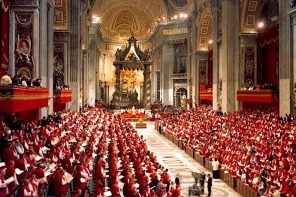In the wake of Benedict’s sudden announcement of his early retirement, Catholic luminaries from Cardinal Timothy Dolan to James Martin, SJ have already begun, as is the custom when a papal career ends, to lionize the leader of the world’s 1.1 billion Roman Catholics.
But on the margins of the Catholic Church, the legacy Benedict began shaping in 1980 as Cardinal Ratzinger, when he was named as Prefect of the Congregation of the Doctrine of the Faithful (the office formerly known as the Inquisition), and which he solidified during a mere eight years as Bishop of Rome is seen as something far more complex and troubling.
UC Riverside professor Jennifer Scheper Hughes, who has studied Benedict’s reaction to liberation theology in Latin America both before and during his papacy, suggests that he leaves a painful legacy for Roman Catholics in the region. Says Hughes,
“Both as Cardinal Ratzinger and as Pope, Benedict devoted himself to a process of undermining, silencing, and marginalizing the theologians, priests, and religious who committed themselves to the liberation of the poor. His legacy in Latin America is precisely this: the systematic dismantling of the infrastructure of liberation theology. Some in Latin America may hope that this period of antagonism has now come to a close. Others are, by now, far more cynical.”
DignityUSA, the advocacy group for LGBT Catholics, has called on supporters “for a period of prayer and reflection as we prepare for the conclave” to elect a new pope who may put an “end to statements that inflict harm on already marginalized people, depict us as less than fully human, and lend credence to those seeking to justify discrimination.”
“It’s hard to identify a figure who has been more oppressive to LGBT people in the religious world than Pope Benedict,” says DignityUSA Executive Director Marianne Duddy-Burke.
From the labeling of homosexuality as “objectively disordered” and “intrinsically evil” in magisterial documents he developed as a cardinal, to condemnations of transgendered people as mentally ill, to more recent attacks on marriage equality as a deterrent to world peace, says Duddy-Burke, the current pope has actively worked to undermine the full equality of LGBT people and denigrated their human dignity. Duddy-Burke notes that the announcement of Benedict’s retirement on the eve of the Christian Lenten season provides an opportunity for deep reflection on the harm such words and actions do within and beyond the Church. She hopes such reflection will fuel action among the faithful in the pews.
“Catholics have proven that they take belief in the dignity of all human persons and Catholic social justice teaching seriously,” she says. In this light, though DignityUSA has not yet announced any formal action, Duddy-Burke sees the days ahead as “an opportunity for Catholics to get in contact with the cardinals who are going to be part of the conclave and talk to them about our dreams for the Church and what we need in a new leader.”
Joelle Casteix, Western Region Director for SNAP, which advocates on behalf of some 20,000 survivors and allies of those abused by Roman Catholic priests, likewise sees the action of laypeople as critical to any meaningful change in the Roman Catholic Church. “The only way that we can have influence,” she says, “is if Catholics sitting in the pews demand change. It’s time for the Catholic laity stand up and demand that the Church truly embody the teachings of Jesus Christ in protecting children.” She sees that as unlikely to happen between now and when the College of Cardinals meets in March to elect a new pope, especially in a Church that “evolves in geological time.”
Pope Benedict, Casteix says, “offered empty promises and apologies” about the abuse scandal “as a PR move” while at the same time “portraying victims as enemies of the Church.” This, she says, has continued to “ensure the marginalization of abuse victims within the Church” even as civil authorities have moved more decisively to extract a measure of justice from abusive priests and the Church leaders who often enabled them to continue as abusers and actively covered up the Church’s protection of them.
The list is long of those within the Roman Church who have been aggrieved by what many have seen as Pope Benedict’s actions to roll back the reforms of Vatican II. Representatives of the Leadership Council of Women Religious (LCWR) declined to comment for publication on Benedict’s impact on communities of Catholic women religious who faced intense scrutiny—some would say persecution—during Benedict’s papacy, offering only a short statement of gratitude on the LCWR website “for his many years of tireless service to the Catholic Church and for the contributions he has made as a theologian, as the head of the Congregation for the Doctrine of the Faith and as pope.”
Still, between the smackdown on nuns and the excommunication and silencing of priests supporting the ordination of women and opposing the Church’s position on birth control, it would be hard not to conclude that Benedict’s papacy has been difficult for women throughout the Church. LGBT advocate Sister Jeannine Gramick, SL, herself no stranger to Vatican disciplinary silencing, argues that “women in the Church have as difficult a time as lesbian and gay individuals. Both are treated as second-class citizens.” She notes that the rebuke of LCWR had much to do with the solidarity many women religious, and women in general, have felt with LGBT people who have been marginalized within the Church and are often alienated from it.
Gramick adds that the “devastating” impact of Benedict’s papacy goes well beyond LGBT persons, women, or other marginalized groups within the Catholic Church itself. “The Catholic Church effects not only its members, but also the wider community in its influence on opinions,” she says. Like others, Gramick draws hope from the actions of compassionate laypeople who support equality but also from “leaders in the Church who are very caring and who would like to be more forthright in expressing that care toward both LGBT individuals and women who want to see the Church change.”
Outside the Catholic Church, Benedict managed to provoke Muslims, Jews, and Anglicans variously in the course of his papacy, sharply distinguishing “God’s Rottweiler,” as he was famously nicknamed, from his far more genial, if no less conservative predecessor, John Paul II.
As Catholics and other Christians ready themselves for the season of prayer, penitence, and self-denial that anticipates the resurrection of Jesus Christ that will be celebrated by a newly-elected pope this year in St. Peter’s Square, it seems only fitting to consider whether Benedict’s legacy itself can be redeemed. Or, perhaps we might pray that the Catholic Church, especially those on its margins, can be saved from the lingering effects of that legacy by radically new leadership.
It is, after all, a season of miracles.




